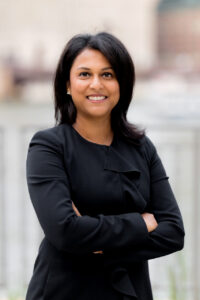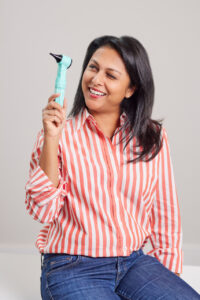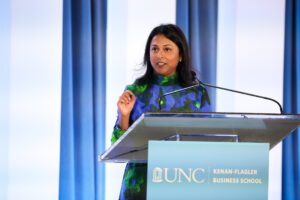News & Stories
House calls

Minni Marwaha (BSPH ’03, MBA/MHA ’08) shares her home office with one of her biggest inspirations.
A small desk covered by crayons belongs to her young daughter. Her chronic ear infections motivated Marwaha to create her startup, Deebo, named after her daughter’s beloved stuffed monkey.
Deebo sells otoscopes – used by doctors to get close looks in ears, noses and mouths – for home use. That’s nothing new. Otoscopes are available in retail stores and online.
But those otoscopes aren’t Deebo’s otoscopes.
Its direct-to-consumer otoscopes, sporting cheerful colors and patterns and now available on deebocare.com, are thoughtfully designed to appeal to children. Each kit comes with two otoscopes: a working tool for a parent with three different tip sizes and a toy version for a child.
Marwaha’s goal: Take the fear out of medical exams for young children while making it easy for parents to figure out what is going on.
Deebo otoscopes aren’t intended to replace a physician. Instead, they are designed to integrate play into routine medical exams for children to lessen anxiety during medical appointments and empower parents to make more informed healthcare decisions for their families.

“I wanted to innovate the home medicine cabinet because it needs to be innovated,” says Marwaha. “And I wanted to do it in a really fun, delightful way.”
It’s a simple concept. There’s no app to download or software to update. The otoscopes come with a booklet of directions and an overview of different forms of ear infections, information that didn’t come with the otoscope Marwaha bought online hoping to take the guesswork out of how to care for her daughter.
Ear infections are the most common reason children are taken to hospitals, with five out of six children experiencing at least one ear infection before they turn 3, according to the National Institutes of Health. Marwaha felt as if she was either catching her daughter’s ear infections too late or too early. She never felt in control.
Products like Deebo’s otoscope and innovators like Marwaha are changing the way people approach medical care. While the use of telehealth and other forms of at-home care grew out of necessity during the COVID-19 pandemic, convenience and familiarity are now accelerating the ubiquity of DIY and virtual medical care. As severe medical staff shortages linger, people continue to make tough decisions about when and where to get professional medical care — or if they need to get it at all.
“I don’t look at this as a revolutionary company or product line,” says Marwaha. “I have nothing but respect for medical assistants and doctors. But I want to change the traditional dynamic between doctors and patients and help people become more comfortable with home healthcare.”
Launching a startup was a risky venture for Marwaha, who never considered herself a risk-taker. Growing up in Raleigh, she was laser-focused on a career within the corporate side of healthcare, perhaps as a CEO of a hospital or health system. Her college path at Carolina reflected that goal.
After earning a bachelor’s degree in health policy and administration, she completed the three-year MBA and MHA dual degree program offered by UNC Kenan-Flagler Business School and UNC Gillings School of Global Public Health.
“I never thought I’d be an MBA person,” she says. “I wanted to be a leader in healthcare administration who could balance for-profit thinking within a nonprofit. That’s what essentially drove me to the MBA.”
She quickly rose through the ranks of her field, serving as a senior operations improvement consultant for Advocate Health Care in Chicago; directing support services and managing pediatric neurosciences and behavioral health services operations at the Advocate Children’s Hospital; and directing the company’s first innovational business unit.
Later, as vice president of core innovation at Advocate Aurora Health, she spent most of her time hearing exciting pitches from entrepreneurs and startups dedicated to finding new ways to solve complex problems in modern healthcare.
She loved the work but didn’t love what happened when she returned to the boardroom.

Marwaha with a Deebo otoscope
“We talked about solving problems, but it always felt like a stranger in the room,” says Marwaha. “The healthcare industry is very risk averse and rightfully so. Decisions easily unravel, and new ideas are often squashed in that kind of environment. I was faced with closed door after closed door. I got frustrated. I didn’t feel like I fit in. I didn’t recognize myself anymore.”
Getting so close to the CEO role she coveted showed her it was no longer for her. She quit in 2019 to focus on angel investing and mentoring University of Chicago students working on health-technology startups, helping them craft effective pitches to hospital executives.
But she couldn’t stop thinking about her business idea: Deebo. She began jotting down thoughts she had about it on her iPhone. Ideas came to her in the shower and as she was getting ready for bed. They were mostly random thought streams, and Marwaha couldn’t ignore them.
She tried to find reasons why she shouldn’t launch Deebo, why it was a bad idea. She couldn’t think of any.
After moving back to Raleigh in 2022 with her husband and two daughters, she devoted herself to launching Deebo.
At the same time, she returned to the UNC Kenan-Flagler community as an active alum and student mentor. She joined the board of advisers at the Center for the Business of Health and joined 100 Women, created by alumnae to mentor and support future women leaders in business. In 2023, Marwaha received the School’s Dwight W. Anderson Young Alumni Award for her work in healthcare innovation and dedication to mentorship.
“Within 100 Women, we’re all alumni from different years. We all have different backgrounds and different interests,” she says. “But we also all have UNC Kenan-Flagler and that’s what brings us together.”

Marwaha accepts the 2023 Dwight W. Anderson Young Alumni Award at a ceremony in Chapel Hill
Her launch of Deebo’s innovative otoscopes could be just the beginning. Marwaha is considering adapting other basic pediatric tools for home use, based on positive feedback from parents and doctors. A pediatric urgent-care center physician reached out to say she views Deebo’s otoscopes as especially valuable since ear infections generally do not require urgent attention and take time away from patients who need immediate care.
“I’ve become more confident with myself as an entrepreneur and a big part of that comes from reconnecting with the Business School and it being there for me in this stage of my career,” says Marwaha. “I realized I have this backbone that’s been built by UNC Kenan-Flagler’s MBA Program and all that I’ve learned through my career so far. It’s a backbone that’s holding me up and telling me, ‘You got this. You can do this.’”